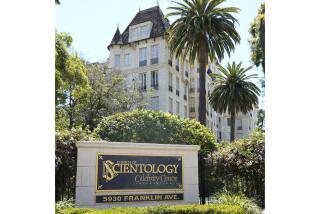Report Urges Dissolution of Scientology Church in France
- Share via
PARIS — Scientology, the Los Angeles-based religion treated with suspicion and hostility by several Western European governments, is now under siege in France, where an official report has called for disbanding church operations here.
A blue-ribbon government panel studying what French officials define as “sects” has concluded that the faith, founded by the late U.S. science fiction writer L. Ron Hubbard, is a “vast enterprise of transnational character” with its own private police force run clandestinely from the United States.
“They have a clear strategy of infiltrating and of trying to influence the state, and the will to do it,” said Denis Barthelemy, a career magistrate serving as secretary-general of the panel, the Interministerial Mission on Combating Sects. “This goes beyond being an ordinary pressure group. For the internal security of the state, we are afraid.”
Panel Also Targets Cult Tied to Suicides
In the report to Prime Minister Lionel Jospin published this month, the panel contends that Scientology is, in fact, a moneymaking venture. The report goes to the extraordinary length of proposing the dissolution here of Scientology and another religious group, the Order of the Solar Temple, which lost 74 members to murder-suicides in France, Switzerland and Canada between 1994 and 1997.
It is the latest controversy to embroil Scientology in Europe, where the actions of courts and governments threaten to put some countries on a collision course with the Clinton administration. A 1998 U.S. law makes ensuring freedom of religion a priority in foreign policy, and the State Department’s worldwide survey of human rights practices released Friday criticized some French conduct.
Tax claims brought against some Scientology churches in France in 1994-95 forced them into bankruptcy, the State Department said. The survey also found that the classification of Scientology and 172 other groups as sects by a French parliamentary committee four years ago contributed to “an atmosphere of intolerance and bias against minority religions.”
“We are in a climate of terror and witch hunts,” said Daniele Gounord, spokeswoman for the Paris Church of Scientology. She noted that the panel’s report is short on specifics to buttress its charges and said Scientologists were never asked to give their side of the story.
“France is dealing with us the exact same way the Chinese deal with the Falun Gong,” she said, referring to a religious movement banned by leaders in Beijing.
However, in the view of the government panel--which was chaired by Alain Vivien, a former member of Parliament--Scientology constitutes a clear and present danger to “public order” and the “dignity of the human person.”
Some former Scientologists agree. “I was turned into a robot,” said Mona Vasquez, a 40-year-old Frenchwoman who spent seven years in the organization. “They made me leave my studies, my boyfriend, my family.”
France is far from the only European country where Scientology, which was founded in 1954 and claims 8 million members worldwide, faces official pressure. In Belgium, police in October raided the local church headquarters and 24 other locations, including affiliated businesses. Thousands of documents were carted away in that country’s largest investigation of Scientology’s operations to date.
In Germany, where the government has denounced Scientology’s “totalitarian structure and methods” as a threat to democracy, church activities are being probed by the Office for the Protection of the Constitution. In the southern state of Bavaria, applicants for civil service jobs are required to disclose any ties to Scientology. According to the German Embassy in Washington, no applications have been rejected on those grounds so far.
“What’s happening in Europe is that more and more countries are expressing concern about the proliferation of groups commonly known as cults and doing more to protect their citizens,” said Ian Haworth, secretary-general of the South London-based Cult Information Center. Among critics of controversial religions, Haworth said, there is broad consensus that Scientology is the “worst group, the most sinister.”
In June, the parliamentary assembly of the Council of Europe, an organization of 41 countries that promotes European cooperation, recommended formation of a continentwide agency to watch over fringe “religious, esoteric or spiritual groups” and facilitate the exchange of information.
In December, the French Senate--with Scientology as one of the potential targets in mind--unanimously approved a bill that would empower the government to dissolve religious sects if they disturb public order or present a “major peril” for their members. The lower house of Parliament is expected to examine similar legislation.
Paris Mayor Jean Tiberi has called for a ban on recruitment efforts by sects near schools, retirement homes, drug-treatment centers and other locales where, he said, society’s “most vulnerable elements” are targeted.
French ‘Are Putting a Religion on Trial’
French officials “are putting a religion on trial,” charged Bill Walsh, a Washington attorney who represents the Church of Scientology International. “They are saying Scientology is a criminal enterprise and should be banned and shut down.”
French authorities, however, maintain that they are not attacking religious beliefs, which are protected by law, but illegal conduct. In November, a Marseilles court found five current or former members of the church guilty of swindling. In 1996, a Lyons court found the former local Scientology director guilty of swindling and involuntary manslaughter in the death of a man who committed suicide after his wife was pressured by the church official to take out a loan to finance $6,000 of church teachings for him.
France also appears to be the only country to have convicted the creator of Scientology of a criminal offense. In 1978, Hubbard was found guilty in absentia of swindling and sentenced to four years in prison. The author, who never came to France, died in 1986.
Leaders of France’s Scientologists indignantly deny the charges against them. They plan to issue a detailed rebuttal.
“These are total hate campaigns,” Gounord said. “We are people who obey the law.”
According to the spokeswoman, the organization’s members in France--she put their number at 50,000--are subject to increasing official harassment, including tax audits, the closing of their schools and police pressure on other French not to do business with them.
French officials reject accusations of harassment. Like some of those who have left Scientology, they paint an unsavory picture of a globe-girdling organization obsessed with making money that uses blackmail, harassment and smear campaigns to keep former members or opponents in line.
According to the French officials and former Scientologists, tight control is exercised from the mother church, located on a Hollywood street renamed in 1996 to honor Hubbard, and from a command center at Gilman Hot Springs in Riverside County.
“All directives, everything we did, was ordered by missionaries from the United States,” said Vasquez, the former member. “Every Thursday, we collected the money from all over Europe and sent it to the United States. Copenhagen [site of Scientology’s European headquarters] obeyed; everything they did was decided by the Americans.”
Barthelemy, the government panel’s secretary-general, said former Scientologists have told French authorities that information collected by the church, including potentially embarrassing or compromising data gleaned from questionnaires and interviews with members, is forwarded to the U.S.
Local Annual Revenue Said to Be $9.2 Million
In June, a French parliamentary commission investigating the finances of religious groups classified here as sects estimated Scientology’s annual revenue in France at more than $9.2 million, and worldwide at between $1.5 billion and $3 billion.
Gounord, Scientology’s Paris spokeswoman, said the only connection the churches in France have with Los Angeles is the training of pastors and auditors, who carry out question-and-answer counseling sessions the church calls auditing.
The French report makes special mention of Scientology’s Office of Special Affairs, which it labels a private police. Stacy Brooks, a former member now working with an anti-Scientology organization in Clearwater, Fla., described the OSA as a dirty-tricks squad that targets the church’s critics.
“I know all about these people,” Brooks said. “They tried to smear and harass me and my husband after I left in 1989.”
Karin Pouw, spokeswoman for the Church of Scientology International, called Brooks a “liar for hire.” Pouw, a member of the OSA, said the office functions as a “public affairs office.”
Faced with the mounting pressure in France, Scientologists said they will call on other countries, including the U.S., and international bodies for help. On Thursday, they plan to hold an international conference in Paris to examine limits placed on religious freedom here.
Gounord said the court cases and official criticism have only increased the French members’ determination. “We always win,” she said. “In Scientology, we believe in what we are doing.”
More to Read
Sign up for Essential California
The most important California stories and recommendations in your inbox every morning.
You may occasionally receive promotional content from the Los Angeles Times.










